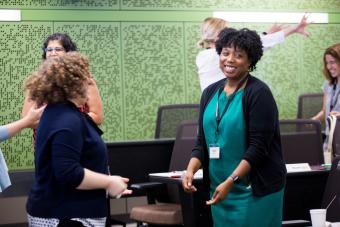Health Communication: Leadership as Evolution
By Mike Mackert
This week is the Center for Health Communication’s professional development event: the Health Communication Leadership Institute (HCLI). As our team prepares for the fourth annual HCLI, I’m struck by the evolution of this event.
One of the great benefits of HCLI is that it is small enough that you can meet every single participant over the course of three days, something we hear about as a strength of the event year after year. Over the years, though, the event has come to represent a richer mix of people and professional roles that all have an interest in health communication and leadership. The first year was dominated by those working in public health: from the Centers for Disease Control and Prevention (and some of its contractors), campus health professionals, government agencies, and public health nonprofit organizations. Now, HCLI also attracts participants from other kinds of organizations (insurance companies, healthcare providers, and professional medical organizations) and doing other kinds of health communication work (organizational wellness promotion, commercial marketing, and advocacy). Every year increased diversity of participants has led to richer, engaging discussions with speakers and among participants.
The programming for HCLI has also evolved over the years. The first HCLI included a bit too much focus on health communication best practices. The second HCLI we overcorrected and focused too much on leadership issues. Reflecting my experience that it takes three tries to get every course right, the third HCLI hit the right balance between those two broad areas. Now with this fourth iteration, we’re including new kinds of content to ensure HCLI is as relevant and innovative as possible – especially as we have returning participants and want to give them a new and rewarding experience. This year, for example, we designed a panel around practitioners doing communication work ranging from running a statewide health nonprofit to leading an advertising agency focused on multicultural and youth marketing. I’m excited for what those panelists will share and what our participants will be able to take away from them.
Finally, we’re proud that this year HCLI has received support from a number of partners: Pfizer, the Truth Initiative, HCA Gulf Coast Division, and The University of Texas MD Anderson Cancer Center. The support and participation of these organizations speaks to the growing reputation of HCLI as an opportunity for professional development and the training of the next generation of health communication leaders.
If you’re interested in HCLI and want to follow along with what’s going on, you can follow the CHC on Twitter (@uthealthcomm) and the hashtag #UTHCLI for what participants will be sharing online.




